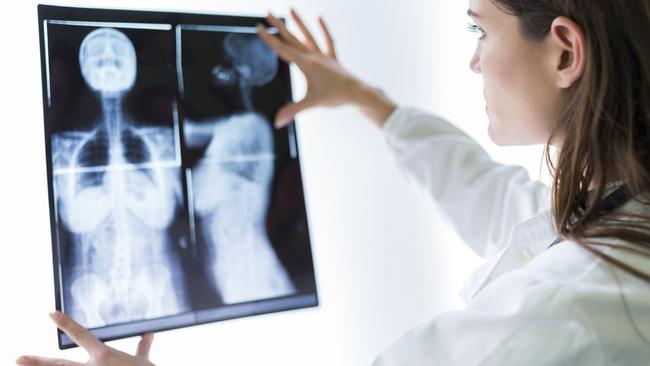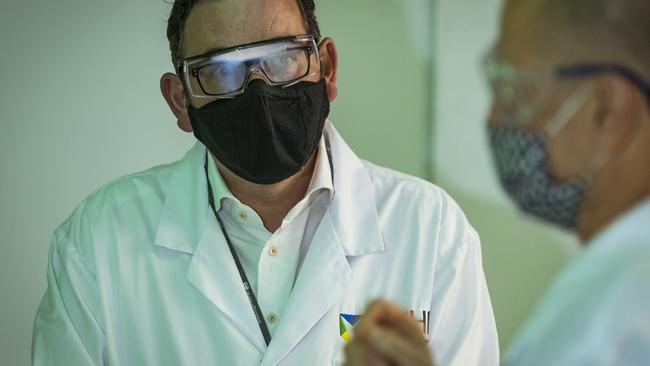How Covid is rising in Victoria and who is now eligible for funded antivirals
Covid cases in Victoria are continuing to climb despite a lack of testing and reporting, as the virus continues to change and new variants emerge.
News
Don't miss out on the headlines from News. Followed categories will be added to My News.
Covid cases in Victoria are continuing to climb despite a lack of testing and reporting, as the virus continues to morph and new subvariants are detected.
Victorian Covid cases and hospitalisations have risen for the second week in a row, with some eight people so sick they are in intensive care.
The Victorian Department of Health on Friday said there were 184 people in hospital with serious Covid.
Cases had risen by 17 per cent over the past week and there had been 35 deaths, it said.
It comes after the state’s Covid hospitalisation rate soared by nearly 60 per cent the week before and 25 Covid-related deaths were reported.
“Victoria continued to see an increase in Covid cases and hospitalisation this week,” chief health officer Bretton Sutton said.
“This increase in transmission is being driven by the combination of waning immunity and the growth in recent weeks of multiple Omicron sub-variants, particularly XBB.1.5.
“The Omicron XBB recombinant strains are the most prevalent in wastewater detections, with XBB.1.5 and XBB.1.9.1 accounting for 42 per cent of detections. Detections of these variants have grown over the past six weeks. Additional XBB sub-lineages such as XBB.1.16 have also recently emerged. XBF now represents 25 per cent of detections, followed by CH.1.1 (11 per cent) and other BA.2.75 sub-lineages (combined five per cent). A group of variants at low levels, and those which cannot be classified due to new mutations, make up 17 per cent of detections.”
The Federal Government announced on Thursday that from April 1, more than 160,000 people aged 60 to 69 would have access to the antiviral treatment Paxlovid, as eligibility was expanded under the Pharmaceutical Benefits Scheme (PBS).
The change was recommended by the independent Pharmaceutical Benefits Advisory Committee (PBAC) and means Australians in this age group with only one risk factor for severe illness – instead of two – will get access to PBS-subsidised Paxlovid.
Health Minister Mark Butler said people in the age group should have early discussions with their doctor or nurse practitioner about whether an oral antiviral treatment suited their health needs, and to develop a plan should they test positive.
Covid cancer link fears
An internationally renowned doctor fears Covid has added to a “perfect storm” of factors, causing cancer to arrive years earlier than usual in some people and making it even deadlier.
It comes as a Melbourne research team becomes Australia’s first to investigate how the virus that causes Covid affects cancer risk.
In an interview with Evidence Based Oncology, U.S. doctor Kashyap Patel said Covid had added to the western world’s obesity epidemic and increased alcohol consumption, triggering inflammatory responses in some patients that increased cancer risk and the speed of the disease.
Dr Patel, who heads up Carolina Blood and Cancer Care Associates, said both he and his colleagues were seeing patients with several types of rapidly progressing cancers, including breast and renal.
The cancers moved so fast in some cases, the relatively young patients did not even have time to receive treatment and died within weeks of diagnosis, he said.
One patient who died of breast cancer was just 26.

“The trend is getting more and more alarming,” he said.
“We are noticing trends in haematological malignancies, breast cancer, colorectal carcinoma, and pancreatic cancer.”
Recovering from years of Covid was like coming out of “a hibernation”, Dr Patel said.
“Combined with the obesity pandemic, people didn’t exercise a lot with the fear of going out in the pandemic and the alcohol intake has increased. All of this descends down on inflammation, and I think it’s creating a perfect storm between risk factors, and we need to learn how to deal with that.”
Meanwhile, a team at Melbourne’s Walter and Eliza Hall Institute of Medical Research, led by Gemma Kelly, is trying to understand how the virus that causes Covid affects the development of cancers, including lung, colon and lymphoma.
“The virus does not directly cause cancer but we know that infected people can have long-term inflammation and that inflammation can impact cancer risk,” Associate Prof Kelly said.
“Our study is about understanding the relationship between the virus and cancer behaviour and then helping to choose the right therapies.”
The institute said this week that as the study had only recently started, it was not yet able to share any findings.
More Coverage

Originally published as How Covid is rising in Victoria and who is now eligible for funded antivirals




